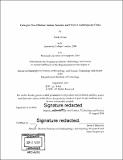Caring for star-children : autism, families, and ethics in contemporary China
Author(s)
Lin, Emily Xi.
Download1121081290-MIT.pdf (13.44Mb)
Alternative title
Autism, families, and ethics in contemporary China
Other Contributors
Massachusetts Institute of Technology. Program in Science, Technology and Society.
Advisor
Stefan Helmreich.
Terms of use
Metadata
Show full item recordAbstract
Caring for Star-Children: Autism, Families, and Ethics in Contemporary China studies the emergence and development of family caregiving for autistic children after 1982, when autism was first diagnosed separately in two cities in China. Based on 18 months of ethnographic fieldwork at municipal specialist hospitals, community child-health clinics, autism rehabilitation centers, and homes of families with autistic children across six provinces, this study explores how social stratification and the turn towards self-governance not only made autism as an epistemic object, but has intersected with that category to create new forms of inequality. In the absence of thorough and consistent state initiatives, moral economies around the child's potential have sprung up. Such moral economies lead actors such as medical professionals, philanthropic and educational organizations, and elite parent-activists to prioritize the young autistic child's potential, and to urge parents to become behavioral therapists for their own children. Parents are urged to let go of the normative societal expectation of recompense in the form of elderly care. I argue in this dissertation that the directives around these moral economies fail to take into account the local and gendered inequities that both produce, and constrain, parental diagnostic and therapeutic choices for their autistic children. Autism's spread as a diagnostic category has paralleled other spatial and economic disparities across the country. The economic reforms which began in 1978 and the devolution of many public functions to the purview of local governments have led to dramatic regional disparities with respect to economic opportunity and, the availability and quality of healthcare, education and social services. Where professional and parental elites in cities such as Beijing refer to autistic children through the valorized term "children of the stars" (a phrase chosen so as to reduce stigma), and are able to provide children in these locations with prompt diagnoses and early therapy, to date many healthcare workers and families responsible for nurturing children in less developed regions of China have not even heard of such a diagnostic category. Many families from rural or otherwise resource-scarce locations in China are not able to obtain a timely diagnosis, much less access therapy for their children. In managing care in landscapes of great disparity, families are turned into diagnostic and therapeutic internal migrants, as they travel across China in search of the appropriate doctors and therapy. I argue in this thesis that the post-socialist emphasis on choice, rather than care, in fact serves to legitimize neglect of the autistic adult and mother of the child. Autism advocacy rights which fail to take into account local forms of stratification thus serve to broaden the burden of care upon families.
Description
Thesis: Ph. D. in History, Anthropology, and Science, Technology and Society (HASTS), Massachusetts Institute of Technology, Program in Science, Technology and Society, 2016 Cataloged from PDF version of thesis. Includes bibliographical references (pages 209-228).
Date issued
2016Department
Massachusetts Institute of Technology. Program in Science, Technology and SocietyPublisher
Massachusetts Institute of Technology
Keywords
Program in Science, Technology and Society.